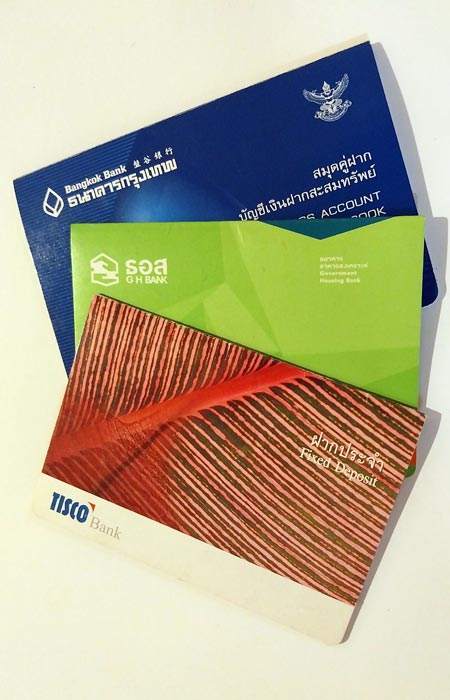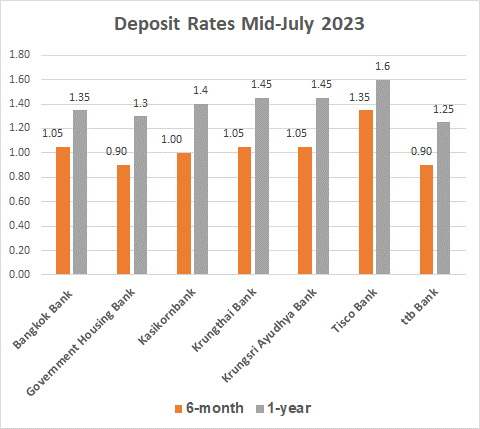Bank Accounts - Deposit Accounts
If you are a long-term resident in Thailand, it is beneficial to open a current account and/or a savings account with a Thai Bank. In some cases, it may be obligatory to have one. For example, if you desire to have a retirement visa, you are required to prove you have 800,000 Thai baht in a Thai bank account. In other cases, it is the most convenient way to be able to transfer money from abroad.
Have lived in Thailand for many years now, we remember the days when opening an account with a Thai bank was a bit hit and run, but overall not difficult. Dependent on the bank, and the individual branch of a bank, you will be able to open an account or not, in other words, getting an account involved a somewhat arbitrary process, and it was (it still is) a good idea not to look to shabby when entering a bank.
It may have been a somewhat arbitrary process, but as far as I recall, you just needed to show your pasport to be able to proceed.

In Thailand, your deposits are registered into your bank book. Probably useful to keep track of your resources, and have the books updated regularly
The last decade or so, and expecially the last few years, things have changed a bit. You may need more documentation to get an account. The document that seems to be most valued is a 'work permit'. Not sure, why it should be valuable, after all, having a work permit today, does not mean you will have one next week, or whether you will have left the country or not.
Not having a work permit (like a retiree), you should be able to provide one or more of a multitude of documents. I still think the requirements depend on the bank and on individual employees. You may be asked to provide (one or more of the following). If you question why, one reason mentioned will always be : for security reasons.
- A chanoot (document showing you own a property)
- Lease of property document, rent agreement, one of the many documents that can be provided by a landlord, indicating where you live
- A taxpayer identification number (a small document provided by a tax office).
- In some cases, the bank will require a 'Certificate of Residence', provided by your embassy, and for which you will have to pay.
- Of course, a passport.
Regarding the taxpayer identification number : you can get one relatively easy at the local Revenue Department Office. They will require your passport, and proof you live in Thailand (in my case, they just called my landlord themselves, to ask about me). As far as I know, if you are retired or not working, having a taxpayer identification number, does not mean you will be taxed from now on. In case of European citizens, it is useful to have, because many services in your home country (like banks where you may still keep some of your resources), will require you to be taxable in another country, if you are not anymore in your home country
Now, for some challenging additional concepts. If you manage to get a regular current or savings account, it does not mean you can ask for any additional banking service. Suppose you want to open a 6-months term-deposit account, or a mutual fund account, or require a credit card. In each case, the bank may want you to restart the process you went through to open the initial account. It is like different banking services are supported by different accounting departments. Maybe bureaucracy has become so overwhelming, that it is very difficult to find your data again, once they are stored away (in the case of paper documents). In any case, having to provide the same documents allover again, makes the whole process a bit tedious. It resembles what happens at the immigration offices, where one also has to keep on making copies of passport pages, and were your picture seems to be taken over and over again
The many requirements also make the whole banking scene less competitive. You may want to open an account with another bank, where they offer higher deposit rates, but give up on it, once you see all the requirements again.
Because the process it so time consuming, it also is not a good idea to close accounts. Just keep an existing account running.
We looked into the present requirements again, at a time we were looking for the best deposit rates available. Below you see rates mid-2023 at some well known Thai banks, and you will notice some differences between them. Rates are provided on the websites, but you may need to be able to read Thai language, and/or have the patience to try to find the data.

Deposit Rates at Thai banks may vary, especially when rates are moving upwards or downwards. Maybe worthwhile to shop around.

